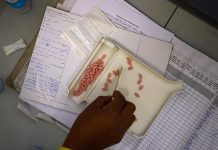Africa-Press – Mauritius. There’s more happening presently than the Baie Jacocet Submarine Cable Survey controversy, which has been hogging the headlines these past two weeks. The recently publishedIMF Article IV staff Report gives a gloomy picture of the present state of the Mauritian economy and the serious predicaments facing it.
In this week’s interview, Rama Sithanen comments on its general presentation and the diplomatic wording of key advisory recommendations. More importantly, he shares with us in layman terms the serious predicaments and grave risks facing the Mauritian economy, aggravated both by external factors, poor public finance management and bad policy choices at the Ministry of Finance and the Central Bank.
Mauritius Times: You have been Minister of Finance and have experience in dealing with the IMF and its Article IV reports. What have you “sniffed” and what new data have you captured from the latest report on the current state of and prospects for the economy?
Rama Sithanen: One must be familiar with the IMF’s approach to fully grasp the meaning and significance of their Article IV reports. They do not always explicitly criticize Government policies as they have to be diplomatic.
One has to diligently read between the lines, decode some carefully crafted sentences to fully comprehend their analysis, findings and recommendations. They embrace three to four postures.
Often, they use a politically correct language to express their views so as not to irritate the country being reviewed in order to maintain engagement especially if the country does not have an IMF programme but is pursuing inappropriate fiscal and monetary policies.
At times, they would even err on the side of political correctness when the actual situation calls for tougher criticisms and observations as they would not want to burn the bridges of continued dialogue.
Many of these institutions also have a soft spot for Mauritius as we have performed well compared to many African countries in human development and they do not want to be seen hitting hard at the poster country of social and economic achievements since independence.
However, they will speak the blunt truth about the economic predicament in one-to-one meetings with the Prime Minister, the Minister of Finance, the Governor of the Central Bank and their senior officers.
And if their messages and policy recommendations continue to be disregarded, they will have no choice than to state the facts and figures in their report so as not to lose their credibility and not to be blamed in case the economic predicament worsens.
The situation changes altogether when the country is in dire straits and has no choice than to negotiate a programme with the IMF to have access to funds.
In these circumstances, tough conditionalities would be imposed to access these critical funds and to reverse the economic decline. As is the case currently with the likes of Sri Lanka, Pakistan, Argentina, Lebanon, and now Ghana.
These countries have often rejected the policy recommendations of the IMF and other independent economists for years with the outcome that we all see.
They are either bankrupt or close to bankruptcy and either cannot import or have extreme difficulties to import essentials such as food, energy, fertilisers and medicine.
They are now on their knees and pleading for assistance from the same IMF that they rebuffed. And worse, the costs of adjustment will be more painful for the population, especially the most vulnerable segments of society.
* Can you give us examples of this multi-faceted approach of the IMF in its last report?
It is clear that the IMF is very disappointed with the role of the Bank of Mauritius (BOM) in the extreme monetization of the fiscal deficit and in depleting its reserves by transferring significant sums to government.
As a result, the BOM does not have enough capital and reserves to conduct proper monetary policies and to defend the rupee. Hence the IMF’s systematic call since some time for the Government to recapitalise the very low equity base of Rs 10bn.
Equally the IMF was totally against the setting up of the Mauritius Investment Corporation Ltd (MIC) under the aegis of the BOM as it encourages quasi fiscal operations that are totally outside the scope of the Central Bank.
This poses systemic risks to the balance sheet of the BOM and distorts both the allocation of resources and adversely affects its independence. The IMF has recommended that the MIC be transferred to either the Government or the DBM and that unutilized funds be returned to the Central Bank to enhance its equity and reserves.
It further states that there is an absolute necessity to safeguard the independence of the central bank and improve its legal framework and its governance.
It underscores that the Monetary Policy Committee (MPC) includes an adviser to the Ministry of Finance and three representatives from the private sector, which may challenge the BOM’s independent decision making.
Absolutely no prize for guessing what the IMF thinks of the independence and governance of the BOM and the composition of the MPC. The IMF argues that Government is lowering its borrowing requirement and its debt through quasi fiscal measures of one-off disposal of public assets instead of credible expenditure and revenue measures.
This strategy is not sustainable in the medium-term according to them. A veiled rebuke is found at paragraph 39 under the heading of ‘Other Issues’. The IMF states that continued efforts are necessary to further strengthen public financial management and fiscal transparency, and safeguard independence of Statistics Mauritius.
If one decodes the sentence, it refers to three critical issues besetting the Government. The strengthening of public financial management refers to significant lapses in procurement and deficiencies in the management of government projects and the need to obtain value for money as well as strict observance of procurement rules and proper management of capital projects.
There is clearly a lack of fiscal transparency as many public funds and debt sit outside the consolidated funds of Government. Some of these figures are also doctored.
For More News And Analysis About Mauritius Follow Africa-Press







